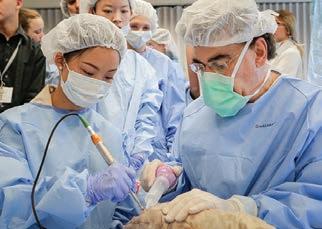
15 minute read
10 COLLEGE INTERVIEW QUESTIONS. Do you know the answers?
people are still unsure of what they really want to do, and that’s normal! Often, it takes students a few wrong turns before they find the academic path they’re meant to travel. That said, knowing your skills and personality can help smooth out the road ahead. When you try new things, you learn about yourself. You discover what activities you love and which aren’t for you.
More importantly, you discover how you like to work, where you thrive, and what kind of lifestyle fits your personality. You might find you love to collaborate with a big team. You might realize you’re pretty introverted and would prefer a career that allows you to fly solo. You might find out you love the challenge of working under pressure and solving tough problems...goodbye, English major, hello, future lawyer!
5. Introduces you to new ideas and people
The world is a big place. Really, really big. Every part of it is filled with unique people and cultures, but most people are only familiar with their own, tiny corner. Broadening your horizons and getting to know people from all walks of life fosters appreciation, respect, and killer success. One study compared the problem-solving skills of groups of students with the same nationality to those with varied nationalities. While students reported being more comfortable working with peers that were similar to themselves, the groups with different nationalities consistently finished faster and were more accurate than the single nationality groups. In other words, being around people who think differently than we do broadens our perspective and allows us to understand life, and ourselves, in new ways.
6. Looks great on college applications
Having a wide range of experiences on your college applications shows the admissions office that you have a growth mindset- you’re excited to learn, up for a challenge, and ready for whatever college throws your way.
You only have one summer 2020, so don’t play it safe. Put yourself out there, take a risk, and get fired up about something new! It might be scary, but you won’t regret it.
AN EXPERIENCE YOU’LL SHARE FOR A LIFETIME
Center for Talent Development
at Northwestern University helps students reach full potential in their subject areas of strength. CTD’s pathways approach leads students on a journey of intellectual, emotional and social growth.
CTD Summer Program
Dig deep into a subject of interest, build upon your academic strengths, and connect with a community of peers. CTD offers • Fast-paced, advanced enrichment and credit-bearing courses • Single and multi-week programs • Residential and commuter options Courses are available for students in elementary through high school in a variety of subject areas including engineering and design, technology, and leadership and service-learning. Visit the CTD website for admission criteria.
Explore all programs online using CTD’s Explore Courses tool!
ctd.northwestern.edu
SUZANNE SHAFFER
f you’re going to college, expect to be interviewed by a college representative. It’s a vital part of the college admissions process. Why? Colleges want to get to know you: Who you are, what your goals are, and how you will contribute to the student population. They also want to see how you answer questions, how informed you are, and your views on other topics.
When my daughter was in the midst of her college search, she was interviewed by a representative of Boston University. Since this was her first choice college, she was nervous. She wanted to make a good impression and appear intelligent and confident. She prepared for some interview questions. Not all of them were asked, but it helped her go into the interview more relaxed. Although she wasn’t a top candidate according to their applicant statistics, the interview resulted in an offer of admission.
You Can Ace the College Interview with Preparation Most high school students dread the college interview. But it doesn’t have to send you running in the opposite direction. With a little preparation and a confidence boost because of the preparation, you can ace the interview. I’m not saying that you should memorize answers to questions, but being prepared to answer these common questions will showcase your communication skills and communicate that you took the time to think and prepare for the interview.
Prepare to Stand out



Early College Program Summer Institute courses provide high schoolers with portfolio development, college credit, and a taste of college life at a world-class institution.

Register now for two- and four-week classes. saic.edu/ecpsi

Art, design, and writing courses for adults, teens, and kids.

Here is a list of 10 interview questions colleges might ask and suggestions on how to respond. They may not be exactly as worded, but they will fall into one of four categories: questions about your fit with the college, questions about your personality, questions about interests and goals, and broader questions requiring a more thoughtful response.
10 COLLEGE INTERVIEW QUESTIONS AND RESPONSES 1. How would you describe yourself to someone who did not know you?
Use this question to communicate your passions and even your quirks. This makes you a “person”and not just a name on an application. Find something that makes you memorable and use it to give the interviewer a snapshot into who you are. You could answer, “I love creating competitions with my friends to see who can run the furthest over a given period of time.” Or you could say, “I do my best thinking in the shower.” Be creative and make this a memorable answer. The colleges have your grades and your application. They want to know what makes you unique.
2. What do you expect to be doing ten years from now?
This question is challenging because ten year from now is six years after you’ve graduated from college. Who knows what they will be doing ten years from now? Odds are you have no idea and haven’t even thought about it. It’s acceptable to answer, “I don’t know”, if you explain your answer. You are still in high school and have no idea what lies ahead. Explain that college will shape who you are, what you pursue, and what career path you take. An honest response is always the best response.
If you are still a freshman or sophomore, think about what summer experiences or programs could expose you to careers that potentially interest you. This way, you may be able to express some thoughts about what you do (or don’t!) expect to be doing.
3. What are your strengths and weaknesses?
Most interviewers love this question and most students answer it with little thought. Think about this question. It’s not enough to say you are a leader or you are a loyal friend. You need examples and incidents that communicate your strengths, and will help the judges »
Acadia Institute of Oceanography Have an AIO Summer!

Unique hands-on ocean science program on the majestic coast of Downeast Maine. 1 & 2 week sessions. All marine environments & recreational activities. Staffed by professional educators. College credit available in advanced sessions
Sheryl Gilmore, Director Seal Harbor, Maine 800-375-0058 www.acadiainstitute.com
46 Years of Educational Summer Programming
understand why you believe they are strengths. When talking about a weakness, be honest. The key is to show that you are taking steps to minimize or overcome this weakness. For instance, if you are a procrastinator, explain how you are developing time management skills, goal setting, and using organization tools to correct it.
4. How would you contribute to our college community?
Be specific when answering this question. Since the question asks about the community, it should be community oriented. How will you make the college a better place? Think about how you see yourself interacting with other students on campus and how you will enhance your experience by becoming involved in activities outside the classroom. Think outside the box on this one and find a way that your own uniqueness will contribute to the community. It helps to explore what activities and clubs the college offers in advance of the interview. The interviewer will appreciate if you know the name of the college radio station or a student organization that you’d like to become involved with.

5. What subject in high school did you find most challenging?
Even if you’re an excellent student, there will be subjects that challenge you. Use this opportunity to show how you tackled the challenge (tutoring, one-on-one with the teacher, study groups, etc.). This shows colleges that even if you face difficulty in a college course, you know how to get help.
6. Why do you want to attend this college?
Use this question to reveal something about yourself that they might not know. Don’t state the obvious and say—because it’s a top-tiered college, or they have majors that interest you, or your parents went there. Walk the interviewer through the thought process you took when selecting the college. This will communicate what’s important to you and show them what you value, why you want to attend their college, and what you hope to gain from an education there.
7. Who do you most admire?
When interviewers ask this question they are trying to learn something about you through the person you »


By SARA LIGHTHART Loyola Marymount University

Why did you choose to participate in a summer program?
Summer programs allow teens to get a realistic snippet of college life in their major of interest. I have had a passion for film since my sophomore year of high school, but I wasn’t exactly sure it was a career I wanted to pursue. I figured attending a summer program in film would be a great way for me to test the waters and see if film was something I would want a future in.
How did you decide which program was right for you?
I had applied to summer film programs across the country and compared each one. LMU offers an exceptional film program, one of the top in the country, so attending their pre-college programs sounded like a wonderful opportunity to further my passion in film while being taught by experienced professionals. I had also toured the school prior to attending their film program and fell in love with their futuristic facilities and welcoming community. What was a typical day in your summer program? I had the privilege of attending two programs LMU offered. Summer prior to my junior year, I attended the Beginning Screenwriting program. A typical day would consist of waking up around 7:00 a.m., getting breakfast, then heading to class from 9:00 a.m. to 12:00 p.m. In class, we learned to write a character analysis, beat-sheets, and scripts. Then, we grabbed lunch and walked around campus, we had an afternoon class from 1:00 p.m. - 3:00 p.m. where we continued our studies. After class finished, we were able to roam the campus, work on homework, use on-campus facilities, or hang out. Then, we had dinner at the dining hall and usually a career-oriented session following. The second program I attended was Acting for the Camera. The structure of a daily agenda was quite similar to Beginning Screenwriting, but instead of writing in a classroom, the class would be venturing around campus, acting in scenes and learning film production skills.
What was the most memorable moment of your summer?
The most memorable moments were “table reads” in the Beginning Screenwriting program. Once someone completed a script, the entire class would sit down and participate in a “read through”. We would read scripts about anything - from a world dominated by watermelons to a boy writing letters to his old house and “the house” writing back.
What advice do you have for teens looking at summer programs?
Get out of your comfort zone. If you have a passion for something, but you are nervous to take the first steps, summer programs offer a perfect way to put yourself in a college simulation. You are able to get first-hand experience as a college student, taking classes you enjoy, making friendships with others from across the globe, and learning to become more independent in all aspects of life. In my opinion, it is better to try something and decide you don’t enjoy it than let it pass you by and regret taking advantage of the opportunity when you had the chance.
admire most. It says something about you so it’s important to explain your choice. It’s not enough just to give a name, you need to know something about the person and why they inspire you. Don’t be frivolous with this question, it shows what you value most in a person and how you will model your success based on that person’s admirable attributes.
8. What is your favorite book and why?
They are not looking for a book report. What they want to learn is more about who you are from the books you read, which are an indicator of your interests, beliefs, goals, likes and dislikes. Did the book make you think differently or cause you to take action? How did you relate to a particular character or setting? It doesn’t have to be a literary classic, but you should be ready to explain why you love it.
9. How have you been a leader or displayed leadership?
Don’t list off a bunch of titles and positions. Focus on one specific leadership position and give detail to show the depth of your commitment. Cite concrete accomplishments like organizing a drive to gather toys for the Ronald McDonald House or enlisting a group of volunteers to teach senior citizens how to use social media. Remember that you don’t have to hold an office or title or elected position to be a leader. Describing how you organized something or motivated a group of people is just as impressive. Leadership isn’t communicated by titles, but by action.
10. What challenge have you overcome?
You can draw from many different types of challenges: academic, personal, work, goals, tragedy, and even an ethical dilemma. This question is designed to determine what type of problem solver you are; college is about developing critical thinking and problem solving skills. The answer to this question will help the interviewer see that you have demonstrated these abilities by overcoming a challenge.
And one last question every college will ask:
Do you have any questions for me?
These questions and answers will not only set you apart from other applicants, but they will give the admissions officer a reason to put your application in the accepted pile. An added bonus is that these questions (or similar ones) will be asked on job interviews. It’s good preparation for interviewing for internships, scholarships, and future career opportunities.



SEE YOU THIS SUMMER! #SummerAtUConn UCONN NATIONUConn Pre-College Summer XPLORE A Premier Summer Program for High School Students
By MIRANDA DEL SOL Tisch Summer High School Program

How did you discover your passion for music?
I grew up watching my dad make music so creating songs of my own felt natural. I thought songwriting was the way everybody processed their emotions. Over time, I realized just how powerful music could be and made it my mission to pursue my passion in hopes I could be there for people the way I felt my favorite artists had been there for me.
What’s your favorite part about performing/ creating?
Creating is an incredibly vulnerable experience and when it comes time to share your work, there’s only so much you can prepare for. I love that when I perform, a certain trust is built between me and a room of strangers. We both decide to open ourselves up to whatever happens next and dare to feel connected.
What’s the hardest part for you about performing/creating?
The hardest part is feeling that the worth of my art directly correlates to others’ opinions of me. It’s easy to doubt yourself when no matter how much you work, you find yourself at the mercy of people’s streams, likes, and follows. Finding the balance between creating work that is true to me despite feeling that my career depends on it’s reception is a constant struggle.
Why did you pick this particular summer program?
Although I consider myself primarily a singer songwriter, I am curious about all aspects of the industry. Tisch’s Summer High School is the only program I found that would not only let me explore my many interests but give me exposure to a wide variety of music industry professionals. Getting to chat with Kesha about her songwriting and receiving advice from Beyonce’s publicist are opportunities I wouldn’t have had anywhere else.
What was your favorite part of this program?
For our final project, we had to produce an original song with randomly chosen bandmates and present a music video, along with our business plan. Collaborating with such a talented group of artists while applying what we were learning in class was priceless. The program definitely delivered on it’s promise of giving us the best summer ever.
How do you think this program will help in what you want to do next? Where do you imagine yourself in 10 years?
I had been interested in NYU for years but attending this program helped me see this truly was my number one college choice. It also gave me the chance to speak to people who have made a career out of their passion and not only inspired me to keep chasing my dreams, but gave me the tools to start making them a reality. In ten years, I see myself releasing music I’m proud of and creating unique concert experiences for my audiences.





